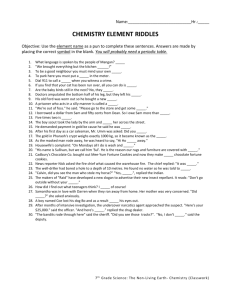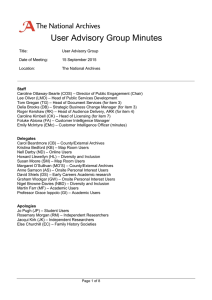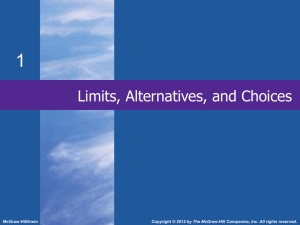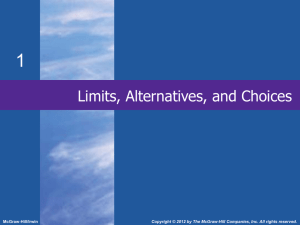User Advisory Group Minutes
advertisement
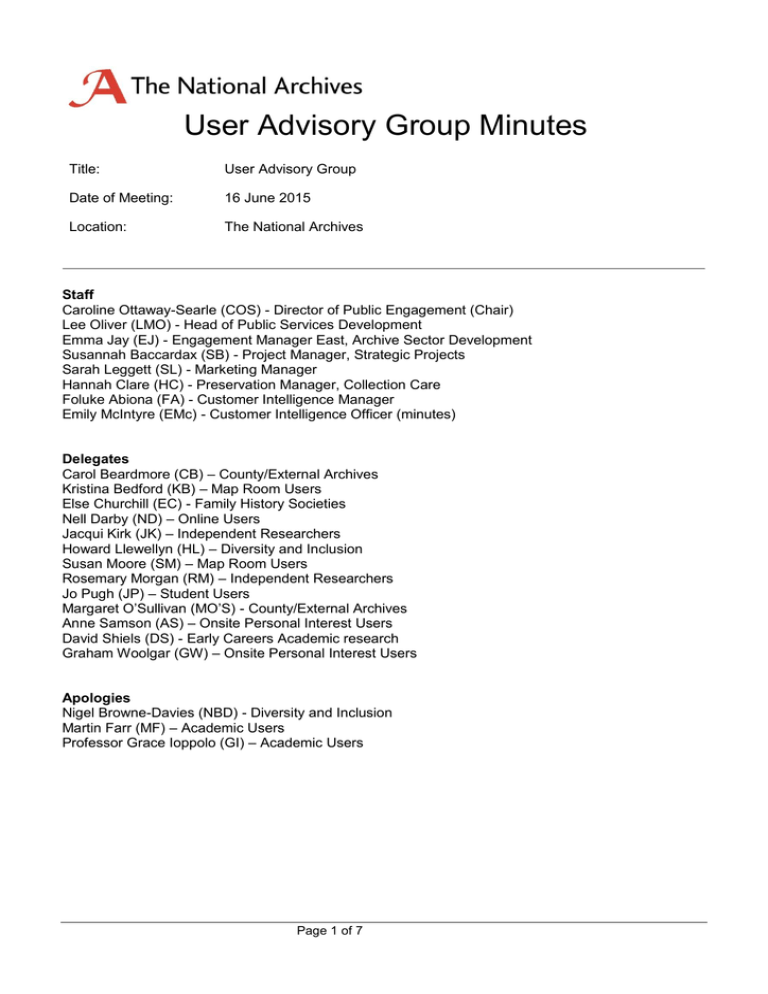
User Advisory Group Minutes Title: User Advisory Group Date of Meeting: 16 June 2015 Location: The National Archives Staff Caroline Ottaway-Searle (COS) - Director of Public Engagement (Chair) Lee Oliver (LMO) - Head of Public Services Development Emma Jay (EJ) - Engagement Manager East, Archive Sector Development Susannah Baccardax (SB) - Project Manager, Strategic Projects Sarah Leggett (SL) - Marketing Manager Hannah Clare (HC) - Preservation Manager, Collection Care Foluke Abiona (FA) - Customer Intelligence Manager Emily McIntyre (EMc) - Customer Intelligence Officer (minutes) Delegates Carol Beardmore (CB) – County/External Archives Kristina Bedford (KB) – Map Room Users Else Churchill (EC) - Family History Societies Nell Darby (ND) – Online Users Jacqui Kirk (JK) – Independent Researchers Howard Llewellyn (HL) – Diversity and Inclusion Susan Moore (SM) – Map Room Users Rosemary Morgan (RM) – Independent Researchers Jo Pugh (JP) – Student Users Margaret O’Sullivan (MO’S) - County/External Archives Anne Samson (AS) – Onsite Personal Interest Users David Shiels (DS) - Early Careers Academic research Graham Woolgar (GW) – Onsite Personal Interest Users Apologies Nigel Browne-Davies (NBD) - Diversity and Inclusion Martin Farr (MF) – Academic Users Professor Grace Ioppolo (GI) – Academic Users Page 1 of 7 Item Action 1. Minutes, Matters arising and general updates 1.1 COS welcomed delegates to the meeting. 1.2 (Item 1.2 03/15) COS stated that TNA’s Shakespeare anniversary plans will be discussed in a presentation given by Susannah Baccardax. 1.3 (Item 1.3 03/15) In response to HL, COS stated that although London Probate Search rooms closure is not TNA’s responsibility we will make further enquiries regarding the index volumes. 1.4 (Item 1.4 03/15) COS updated that the Royal Naval cards are on track ready for publication in July 2015. 1.5 (Item 4 03/15) COS stated SL will answer delegate submitted items regarding WDYTYA. 1.6 (Item 6.15 03/15) COS stated delegate submitted items regarding Websense will be addressed. 1.7 SM asked whether Nick Kingsley has been replaced. COS replied there is an interim in place, Isobel Hunter, Senior Manager Engagement Team in ASD. 1.8 SM asked how long she will be in that post. COS replied she was unsure as it will take a while to recruit. 1.9 (Item 6.14 03/15) GW requested an update about WO 416. LMO replied that MoD have been in and are currently formulating a response. 1.10 GW asked when this will be. LMO replied he does not know. 2. The National Archives’ Engagement Team- working with the wider archives sector 2.1 EJ gave delegates an overview of TNA’s Archive Sector Development (ASD) department. We have had the leadership role for the Archive Sector since 2011, ASD also carries out the HMC function for private records, has 4 regional engagement managers, facilitates Archive Service Accreditation and leads on the 20 year rule. 2.2 HL asked if there is a different set of Engagement Managers for Wales. EJ replied yes, there is an Engagement Team that deals with Wales. 2.3 EJ went on to explain the training the Engagement Team provide. She stated it is not about how to be an archivist but more about how to manage the systems in place. EJ described her job role; she deals with about 50 archives and gathers Page 2 of 7 FA information to aid TNA in relation to its leadership role. 1-3 days a week she is out of the office on visits. She engages with groups such as ARA and she is the TNA representative for 2 regional archives councils. The Engagement Team’s primary role is advocacy, supporting services and challenging places that do not meet national standards. EJ highlighted the challenges facing the sector where TNA can help provide support and guidance including with publications such as In a spin. With resources focussed on specific areas and archive service training partnership projects bringing everyone together. 2.4 EJ stated that the MoJ have delegated funds for the second phase of the 20 year rule. HLF and ACE also provide funds and advocacy is also promoted via campaigns such as Explore your Archive. Accreditation is also another aspect of advocacy, it replaces the self assessment and previous standards, it is hoped that all archives will have applied for accreditation by 2017. 2.5 HL asked what happens if an archive does not get accreditation. EJ replied that they can reapply. 2.6 MO’S asked how long does it last. EJ replied that accreditation lasts 6-7 years. 2.7 EJ continued discussing aspects of the accreditation scheme. Highlighting there is room for negotiation for the amount of days an archive must be open, with the minimum 3 days if they wish to be accredited. They must show they can improve access, balancing their needs and resources and the interests of the community. EJ then discussed risk management, conservation, standards and disaster planning, mentioning that the archive must also provide information for budgets and legalities. She stated that although of course there can be no guarantee the precondition of accreditation is for future sustainability. 2.8 CB argued that it is not surprising that user numbers are dropping when services are being cut. Digital access is not necessarily a substitute. EJ replied that many options are explored and the increase in users 55+ has been predominantly online users. CB stated that she does not go online and cannot find what she wants when she does. EJ replied that it is a slow transition, and must include both aspects of access. 2.9 MO’S commented that the length of time of accreditation, 6-7 years seems a long time. Changes happen very rapidly, and this time scale gives a false impression of stability within the profession. EJ replied that she and engagement managers will be aware of major changes and there is continued communication once accredited. MO’S stated that the benefits for accreditation are clear but that there is a gap and TNA should consider regular reviews of work. Feedback for long running schemes would be beneficial as TNA need to reinforce their sector leadership with regards to accreditation as well as a playing a reassuring role for those who face services being cut. EJ thanked MO’S for comments and agreed that communication may need to be Page 3 of 7 reviewed. RM mentioned that within Surrey Archive the microfilm was no longer being used onsite, due to it all being online and so there has been a large decrease in users’ onsite. SM responded that in contrast Cornwall Archive is open 3-4 days a week and you have to book weeks in advance as it is so busy. 3 Separate confidential minute. 4. UAG recruitment update/ Draft amended UAG Terms of Reference 4.1 COS stated that the plan to recruit to UAG membership will follow the same pattern as last year, and asked if anyone had any questions or concerns. 4.2 JK asked for confirmation of who would be leaving. COS replied GI, GW, EC and SM will have served the full term and would stand down. 4.3 GW said that the replacement Onsite Personal Interest User should attend the User Forum regularly. JK replied this might be difficult and that maybe they could do a monthly rotation. GW replied that the Onsite representative should be a frequent user. 4.4 COS mentioned that the UF numbers have dropped. GW agreed and suggested a need for revitalisation. COS stated that ideas have been looked into for this. AS stated that she would be happy to attend UF if she was not out of the country. 4.5 COS stated that she wants to phone all the departing UAG delegates for feedback on the recruitment process. 4.6 GW asked about the first amendment within the Terms of Reference. LMO replied that it had been lifted from the new members’ pack, to maintain consistency between the two. 4.7 GW suggested a change to the last sentence of the ToR. LMO agreed. LMO 5 Space programme - an introduction 5.1 LMO apologised for the absence of Paul Davies and mentioned that Jeff James spoke previously about this topic, during his briefing on the strategic plan. Page 4 of 7 5.2 LMO said that over the next 4 years there will be a review of the use of space, seeking to improve better use for current and new audiences. There are a number of drivers including actively welcoming different users into the archives. For example we held a Magna Carta event on 15 June 2015 for 120 school children, our current space made this a challenge for the event. Currently display material is restricted to the Keeper’s Gallery, we would like to display material in different areas of the public space. Ideas have been gathered from universities, galleries and others for new concepts. 5.3 There followed a general discussion about various aspects of the use of space, such as children, facilities for parents, the staircase displays, commissioning of artists, the number of window seats. 6 Delegate Submitted Items 6.1 JP asked what is blocked via Websense on public PCs. LMO provided a hand-out containing categories and replied that currently WordPress was being unblocked by IT security and was to be monitored for its impact. Facebook and email are blocked within the reading rooms as well. There followed a general discussion regarding the need to have blocked categories, and the time taken to unblock requested sites. 6.2 KB asked about whether the bookshop was going to broaden its stock to include pre-eighteenth century material and said that many people are not aware of the archive material as the bookshop is not balanced. COS replied that we will take that into consideration. There followed a discussion regarding the general representation of visual images, posters and banners throughout the building, concluding similarly that there is a lack of awareness regarding the archives holdings. 6.3 KB asked whether TNA accepted donated transcriptions from records (referring to a call for volunteers by the Friends). LMO replied that their may have been a misunderstanding - the Friends had requested volunteers for cataloguing but not transcribing. 6.4 JK asked whether it was possible to give advanced notice of which TNA experts were going to attend WDYTYA Live. SL replied that there were different logistics involved with Birmingham, they decided to bring generalists rather than specialists so there was a balanced team for there and onsite at TNA. JK asked whether they could have more information before they went. EC mentioned that SOG had issues of booking who was going to be there and what subject areas they could help with. EC also said that the last minute changes Page 5 of 7 to talks meant the main stage was finalised in November but there are variables and a gamble as to what slot will be given. It was confirmed that all talks were published on the online show guide. SL stated that TNA had to obtain ministerial approval to attend which is timeconsuming, and so prevents early confirmation of speakers and talks. 6.5 New updated members’ packs were handed out. 6.6 JK asked for comments on the Discovery webinar, she asked why is it not just recorded like a video rather than a webinar. LMO replied that they want the webinar to work, so they are still finding software that works, it is a learning curve along with the presenting style being different. CB suggested Adobe Connect, commenting that it was a good presentation. LMO asked the UAG to send feedback. 6.7 JK asked for an update on progress regarding accessibility – LMO circulated a paper responding to each of the identified actions. SM mentioned that reading rooms could do with more lamps than there are. LMO replied that they had already bought more. JK asked if the computers could be adjusted. LMO replied that the installation of Thin Clients on the back of monitors meant they could not be adjusted, but we do have height adjustable desks. When the equipment is due for replacement, we will include this in any replacement, if possible. JK asked about disabled access, there are no indications of it online or on the map leaflet. Could there not be something on the blue drop down pages for accessibility. LMO replied that there is an accessibility page on the website, but currently LMO has no resources to put into updating the content. 6.8 SM enquired into the provision of gloves in the reading room for reading certain series of records. She asked what the current policy is. HC replied that gloves are discouraged at TNA. HC suggested that they should complete a document condition feedback form with particulars of any issues arising from handling documents. They must see which ones may be causing issues, so far only 3 out of 4,000 have mould. A general discussion on the topic of gloves then followed. During which it was confirmed that gloves are discouraged, as they cause more issues than they solve, but if absolutely essential they will be provided. No harmful mould has been found in the collections, but any suspicions should be reported. 6.9 GW asked for an update on the transfer of the “Inter-War” collection of Soldiers service records to TNA. Page 6 of 7 ALL LMO replied that there is no update to give. TNA remains keen to transfer the material, but the decision rests with MoD. GW stated that the TNA finding aids for the WO 97/118/119 collections do not work in conjunction with Find My Past. LMO replied that this has been identified before. Although we cannot ask FMP to re-index these series to resolve the issue, we are aware of it and so will prevent future occurrences. GW asked about digitisation updates on WO 12 and FEPOW material. LMO said that he will respond via email as the UAG has run out of time. Any other business. Next meeting: Tuesday 15 September 2015, 12:00-14:30 Page 7 of 7 LMO
